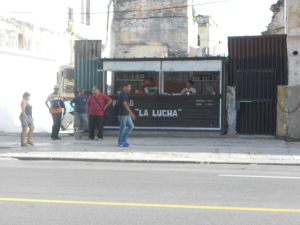Pedro Figueredo Perucho, a citizen of Palma Soriano, was transferred to a hospital in the city of Santiago with acute renal insufficiency, fever, shivering and loss of consciousness. Even though his relatives made efforts to hospitalize him, it turned out to be impossible. Doctors stated he should receive treatment at home and at the location of his residence.

Nearly one month has passed since then, and Figueredo Perucho has not undergone any required overall examination. “We had to return to Palma early in the morning, taking a bus and walking. My father has not eaten for several days and what’s even more worrying, he cannot urinate. He’s really sick,” says his son, Pedro Michel Figueredo.
His wife Irma, desperate to see how her husband’s health is gradually worsening, says: “We went to see a urologist in San Luis twice. It’s a long journey. The expenses are piling up, but in the end, nothing is resolved. ”
Pedro Figueredo Perucho is not just a common citizen, he is a great-great grandson of a patriot who, mounted on a horse, composed the national anthem of Cuba. Today it is sung in schools every morning while the flag is hoisted and at official events.
“Being a descendant of Perucho, the national anthem composer, has never served us anything. Quite to the contrary, nobody relates us to him. What a disgrace to live like this: in a shabby house, unemployed, without proper food and medical care,” says Yanet Figueredo, daughter of Pedro.
As a young man, Figueredo Perucho was an engine room genius and merchant seafarer. Thanks to his technical knowledge and skills applied in his job, he managed to travel half the world. His family lived in abundance until the socialist camp fell down. Economy hit bottom as the Special Period was established and the government had to close many frontlines, including the naval one where he worked as a salesman, selling even ships, among other things.
The family situation thus started to deteriorate marked by the lack of money, cold meals and the necessity of persistent inventiveness. Figueredo Perucho had to dedicate himself to mechanics. He became the most famous mechanic in Palma Soriano, being able to fix any type of motorbike and car, all in exchange of something unprecedented: he would never take a single centavo. As he put it, the situation was hard and Cubans must help one another. Every once in a while he would get compensated by a company’s director who would give him a gift in exchange for his services or by well-off people who forced him to accept a few dollars not being able to understand the altruism of this poor guy from the Paquito Borrero Street.
In 2001 he participated in Proyecto Varela which by means of a particular number of signatures called the government for holding a plebiscite. “I felt excited with that sort of a pacific fight. I thought I would accomplish a certain moral obligation”, said Pedro himself some time ago.
For this reason, political police set a trap for him and after a quite confusing ploy condemned him for committing a common crime to four years of imprisonment in Centro Correccional El Caguayo penalty facility where he served his sentence until the very last day requested.
Upon his release, he wore himself out by applying to the U.S. Refugee Admission Program of the US Department of State in Havana which in the end reviewed his case as inadmissible. His desire to gain freedom outside his country was completely suppressed. He succumbed to depression, his kidneys collapsed.
Today, with the last few resources they have, the Figueredo family is desperately seeking medical care and treatment for Figueredo Perucho as they are anxious about his life; his body and spirit keep fading away.
“Dying for homeland means living”, says Pedro Michel as he shoots down a pigeon to make broth. “These are really nice, poetic words, but my father might be dying here for our homeland the same way as his ancestors were. At the end of the day, it would resemble the absurd destiny of our family.”

Leave a comment